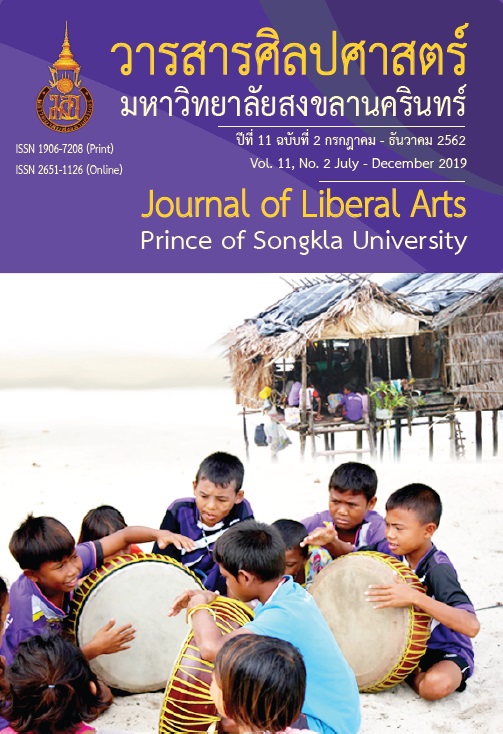Revitalizing the Crisis Music Culture of the Moken in Surin Archipelago National Park, Pang-nga
Keywords:
Moken, Moken music, cultural restoration, youth and community participationAbstract
This study was conducted with the following objectives 1) to develop a knowledge set of music culture of the Moken in Surin Archipelago National Park, Pang-nga and to create awareness of the need to preserve it among the Moken youth, and 2) to propose participative plans for network partnership to revitalize, preserve, and sustainably build Moken music as culture capital.The study combined ethnomusicological approaches, including ethnographic fieldwork and in-depth interviews with 5 key informants along with related literature and active research methods between researcher (s), the Moken community, volunteers, and network partnerships focussing on crisis music culture revitalization. The results were: 1) the knowledge set was developed of the music of the Moken for the purposes of revitalization including a knowledge set of Moken music culture and a knowledge set of Kating instruments, involving nine emerging young Moken musicians, 2) Guidelines and measures for fostering participation which include searching for representatives from the community and network partnership, determining the goals and roles of participants, feedback and post-study reflection, and disseminating the results among other Sea Gypsy groups. Suggestions on how to revitalize music culture include an emphasis placed on youth participation as they are vital to the maintenance of the tradition. The mechanism of participation can be further developed to sustainably build the music-culture capital of the Moken in terms of both policy and praxis.
References
Arunothai, N., Na Pomphet, P., Thaewchaturat Father, A., and Banthaothuk. C. (2006). Way of life of the Moken. Bangkok: Andaman pilot project, Social Research Institute, Chulalongkorn University. [in Thai]
Craft, G. (2007). Participatory Action Research: Involving "All the Players" in Evaluation and Change. Retrieved January 28, 2019, from http://www.grantcraft.org/guides/participatory-action-research.
Hart, R. (1992). Children’s participation: From tokenism to citizenship, Innocenti Essays No. 4, Florence: UNICEF.
Srisuksai, Y. (2002). Socio-economic and cultural changes: A case study of Sanga-Ou Sea Gypsies at Ko Lanta, Krabi Province.Thesis: Chulalongkorn University. [in Thai]
Tansupol, A. (2016). Cultural ecology: The Key to sustainable development. Journal of Humanities and Social Sciences, 12(1), 211.
Tepthai, K. and Yama-chiaw, W. (1985). Chow-lea. Rusamilae Journal, 8 (2), 54-63. [in Thai]
Ungpho, R. (2015). Sea Gypsies Ceremony Music in Andaman Coast of Upper Southern Thailand. Bangkok: The Thailand Research Fund. Ungpho, R. and Chandrausu, N. (2018, July 23-24). Lost in spirituality: Participatory methods for engaging local children in the revival of Sea Gypsy Song. In Sumittra Suraratdecha (Chair), Third International Conference on Documentary Linguistics-Asian Perspectives. Organized by Research Institute for Languages and Cultures of Asia (RILCA).
Ungpho, R. and Chandransu, N. (2019). Moken and the revival: Music learning management for sustainable preservation of the community’s cultural heritage. Bangkok: The Thailand Research Fund. [in Thai]
Wilcox, D. (1999). A to Z of Participation. Joseph Rowntree Foundation.
Downloads
Published
How to Cite
Issue
Section
License
The authors retain the copyright to their article but the Journal of Liberal Arts, Prince of Songkla University reserves the exclusive rights to first publication.






